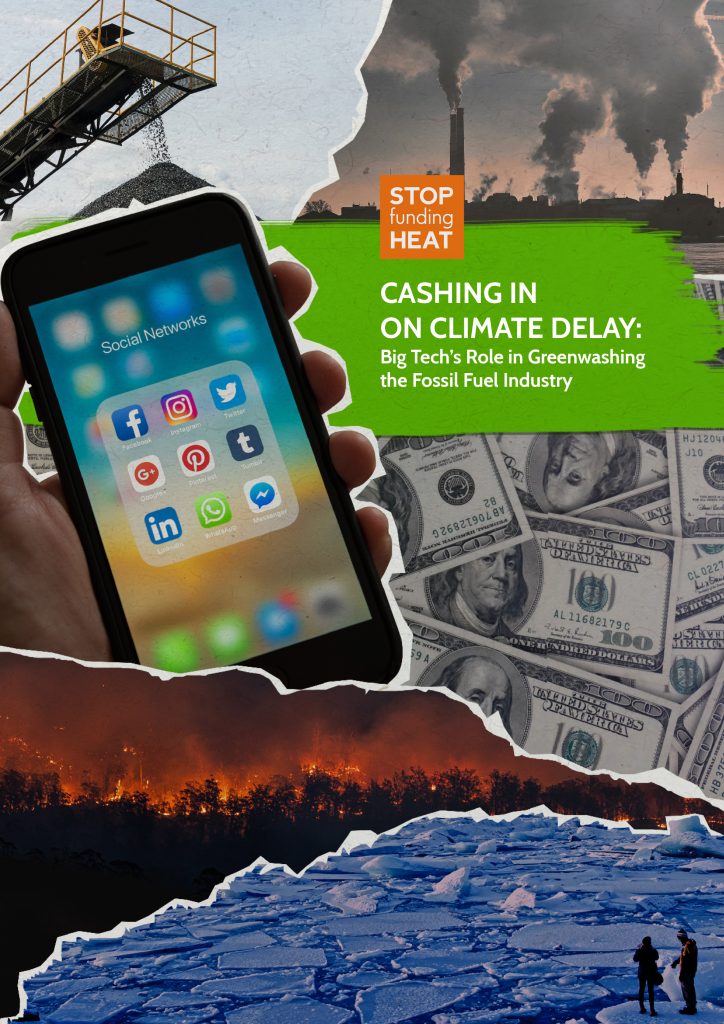The Problem
The fossil fuel industry has known about the environmental damage of its oil, gas and coal products since at least the 1950s. Yet for at least 60 years the industry has leveraged Information and Influence Campaigns (IICs) to mislead the public, scientists and policymakers alike. The industry has covered up the science, denied the facts and leveraged multi million pound campaigns to delay policy.
Fast forward to 2023, and big tech platforms are profiting from this activity. Companies like Meta, Twitter and Google directly receive up to tens of millions of dollars every year to place misleading adverts from oil and gas giants like ExxonMobil, BP, Shell and Saudi Aramco.
Our report, Cashing in on Climate Delay covers over 150 academic studies, reports and articles, exposing the strategic nature of fossil fuel greenwashing and the enabling behaviour of big tech platforms. Download the full report below.
We have launched this report alongside another from Global Witness. Fossil Fuel Greenwash examines the adverts and organic posts from BP and Shell in the United Kingdom. It finds that adverts placed on Facebook and Instagram from these companies rose in 2022, and that the adverts contravene the UK government’s guidance in the Competition and Market Authority’s Green Claims Code. The Global Witness report also highlights the lack transparency on Meta’s ad library, as well as greenwashing activity on organic posts on Twitter.
What can we do about it?
Big tech platforms have little to no transparency when it comes to the money they take to greenwash the fossil fuel industry. That is why we have launched Greenwash Dog alongside our report – a crowdsourced database of fossil fuel adverts founds on Twitter, LinkedIn, TikTok, YouTube, Facebook, Instagram and more.
Greenwash Dog will help expose the breadth and depth of misleading greenwashing adverts from the fossil fuel industry, as well as the need for big tech platforms to clean up their act on this crucial issue.
Executive Summary
The science on climate change is clear – we need to rapidly reduce our reliance on fossil fuels to avert the worst impacts of global temperature rise.
Despite many fossil fuel companies reaching this scientific consensus decades ago, the fossil fuel industry continues to deny the science, deceive the public over the solutions and its role in delivering them, and delay meaningful policy on climate change. The fossil fuel industry does this through leveraging “Information and Influence Campaigns” (IICs). Chapter 2 traces how these complex, multi-faceted, and well-resourced campaigns developed from the 1950s to the present day, culminating in the most contemporary form of climate misinformation: greenwashing.
Greenwashing is defined as “the creation or propagation of an unfounded or misleading environmentalist image”.
The term allegedly originated from hotels asking customers to use fewer towels in the name of the environment in the 1980s. However, fossil fuel greenwashing is a specific form of greenwashing. When seen in the context of climate change the industry’s wider Information and Influence Campaigns, fossil fuel greenwashing is far more harmful. The activity successfully delays climate policy, thus keeping the world locked in to fossil fuels for as long as possible. As the UN Secretary-General Antonio Guterres said during the World Economic Forum in Davos in 2023, fossil fuel companies have behaved “just like the tobacco industry” and rode “rough-shod over their own science”.
Greenwashing itself is a diverse, multi-faceted communications technique that is still developing – with governments and regulators playing catch-up. In chapter 3 we synthesise the latest research, present 20 of the most common greenwashing techniques used by the fossil fuel industry and look at the effectiveness of greenwashing adverts.
Online platforms are among the many actors in the “public relations machine raking in billions to shield the fossil fuel industry from scrutiny”. Big Tech platforms are fast becoming the dominant frontier of fossil fuel industry greenwash. With vague or unenforced climate misinformation policies, platforms are profiting from activity that successfully delays the necessary action for a liveable planet.
As well as spreading organic content, platforms take money directly in order to promote fossil fuel greenwash. In chapter 4 we review reports estimating money taken by Facebook, Instagram and Google to greenwash the fossil fuel industry. We conservatively conclude that this figure is at least in the tens of millions of dollars every year. On other platforms with little to no advertising transparency like LinkedIn, TikTok or YouTube, it could be as bad or worse. In chapter 5, we explore a recent example of the impact of greenwashing and wider Information and Influence Campaigns, where the text of the Paris Agreement was nearly lost at Cop27.
If the fossil fuel industry continues to burn fossil fuels at the current rate, it will bring harm, loss and damages to billions worldwide, many of whom did very little to create the climate crisis. Yet online platforms like Facebook, Google, Twitter, Instagram, YouTube, LinkedIn and TikTok are complicit in greenwashing for the fossil fuel industry and profiting from the misinformation they continue to publish. Given these platforms’ keenness to announce commitments to net zero and climate change action, this activity stands in direct contrast. Worse still, it is impossible to quantify the impact due to low or no transparency on platform advertising.
This report sets out a number of recommendations that would bring online platforms in line with the net zero trajectory they claim to be on, and stop them profiting from the proliferation of fossil fuel industry greenwashing.
The recommendations include:
• A “tobacco-style” ban on all advertising from fossil fuel producers.
• Opening the black box transparency on adverts placed from the wider fossil fuel industry.
• Reduction of viral content pushing fossil fuels as a climate solution.
• Health warning labels for fossil fuel content.
At a time of growing international momentum to tackle the issue of greenwashing, online platforms must engage with the issue and introduce meaningful and comprehensive changes, otherwise they risk being a complicit partner in delaying and derailing necessary climate action for a liveable planet. It is the job of governments, regulators, and the public, to hold these platforms to account and demand that they stop spreading the misinformation of big polluters who are systemically and knowingly undermining the habitability of our planet.


